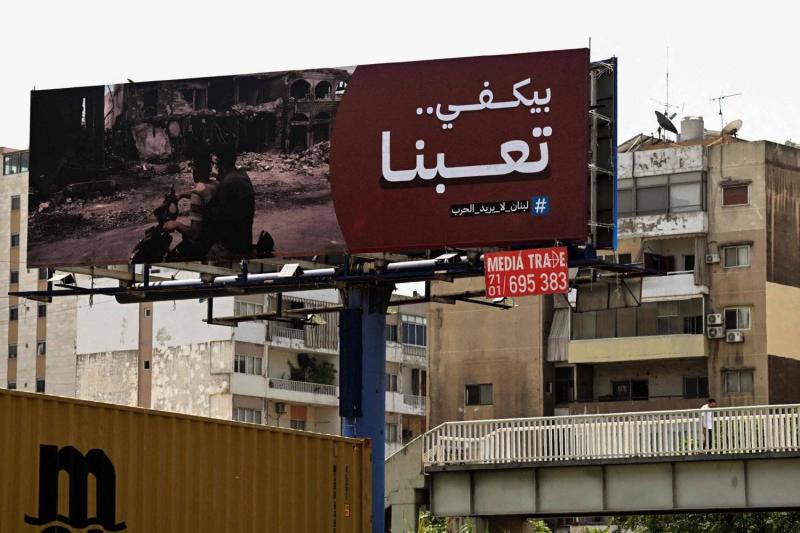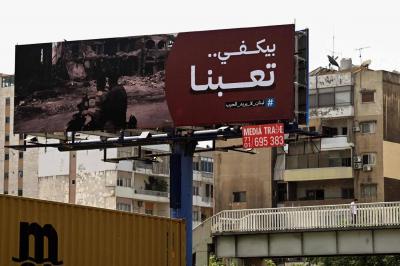In some Lebanese streets, billboards displaying slogans such as "Enough - We are tired" and "We Don't Want War" have emerged, mostly in areas associated with opposition forces and certain neighborhoods of Beirut. This is a manifestation of discontent over Hezbollah's "support war" launched in southern Lebanon, which threatens to plunge the country into a broader conflict amid escalating military operations between Israel and Hezbollah, along with the assassination of high-ranking party leaders.
Notably, these slogans, which provoke the ire of Hezbollah supporters, remain "fatherless," as no opposition forces or civil organizations that typically call for Lebanon's neutrality in conflicts and wars it cannot bear have adopted them. Regardless of who stands behind them, the opposition believes these slogans represent the views of most Lebanese people.
**Opposition: Natural Objections**
A leader within the Lebanese opposition posits that these slogans "represent the opinion of the vast majority of the Lebanese people across all sects, areas, and affiliations." In a statement to Asharq Al-Awsat, he noted that "the victims falling due to Israeli operations are sacrificed at the altar of the Iranian project, not on the path to Jerusalem or in defense of Palestine." The leader, who requested anonymity, stated: "It is natural for objections to rise more and more. This is the stance of all those rejecting the choices made by the party and dragging Lebanon into conflict." He also indicated that "the Shiite community, which used to forgive all Hezbollah's mistakes, is beginning to show signs of discontent, as the party has caused destruction of their homes, loss of life, and displacement, proving the ineffectiveness of its narrative that it alone can protect them and the country."
There is consensus in Lebanon on the principle of opposition to Israel and that the Palestinian cause is the foremost issue for Arabs and Muslims. However, there is real disagreement regarding a single group monopolizing the drive towards war. The opposition leader posed the question: "Why is Lebanon the only front opened against Israel, while Nasrallah exempts Iran and Syria from responsibility in engaging in war with Israel? Is it conceivable for Lebanon to remain an open battleground for Iranian reckoning with the U.S. and the West?" He argued that "the damages incurred by tourist establishments and the disruption of the political season are substantial and irreparable, while the government is neglecting its responsibilities towards the Lebanese people and their future."
**Hezbollah: A Campaign Serving the Enemy**
What infuriates the party's environment and supporters is that this campaign resonates in Israeli media, which sees it as a means to influence the party and exert internal pressure so that it does not lead to the destruction of Lebanon. A source close to Hezbollah told Asharq Al-Awsat that "recognized entities stand behind this campaign and promote the lie that the party wants war and is dragging the country to ruin," pointing out that this campaign, "which began on the roads and was widely spread on social media, serves, whether intentionally or not, the enemy that harbors ill will against Lebanon and the Lebanese people."
Although this campaign has remained anonymous, it is being closely followed on social media, receiving broad engagement from the public.
**Said: The Lebanese Reject War**
Former MP Faris Said, head of the "Ladies of the Mountain Meeting," asserted that while no one has explicitly endorsed the slogans, "they express the opinion of the vast majority of humanity, including Lebanese who reject war, as people innately oppose war and violence." Said emphasized in a statement to Asharq Al-Awsat that the Lebanese “will not submit to the agenda of a team that takes them to war and decides their fate and the fate of their country and the future of their children,” stressing that "these slogans alone do not deter Hezbollah from dragging the country into conflict, but rather the unity of the Lebanese and their adherence to their principles."
Said added: "Hezbollah seeks to realize Iran's interests in Lebanon, but unfortunately, there is no team in Lebanon standing against it and providing a vision for the finality of the Lebanese entity, and adherence to the Taif Agreement and the Arabic and international legalities."
Many agree that "Hezbollah" derives its strength from the weakness and conflicts of its opponents, who are driven by political and partisan interests. Faris Said noted that "Christian parties are beginning to prepare for legislative elections two years before their scheduled date, seeking to strengthen their blocs in parliament, especially after the dismissal and resignation of several members of the Free Patriotic Movement, while they remain absent from the real event at the Philadelphia border and the settlements being arranged at the regional level."
In Faris Said's view, Lebanon's problem lies in "a team planning to completely integrate Lebanon into a dangerous Iranian project, and we are addressing it with slogans raised on the roads that cannot change the scene or alter the Iranian and Hezbollah project."




